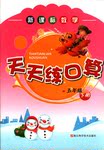题目内容
--- How did the prisoner escape?
--- By climbing a fence and someone’s car. .
A. steal B. from stealing C. to steal D. stealing
D

 口算小状元口算速算天天练系列答案
口算小状元口算速算天天练系列答案 天天练口算系列答案
天天练口算系列答案
D
I shall never forget the night, a few years ago, when Marion J. Douglas was a student in one of my adult-education classes. He told us how tragedy had struck at his home, not once, but twice. The first time he had lost his five-year-old daughter. He and his wife thought they couldn’t bear that first loss; but, as he said, “Ten months later, God gave us another little girl and she died in five days.”
This double bereavement was almost too much to bear. “I couldn’t take it,” this father told us. “I couldn’t sleep, eat, rest or relax. My nerves were entirely shaken and my confidence gone.” At last he went to the doctors; one recommended sleeping pills and another recommended a trip, but neither helped. He said, “My body felt as if it was surrounded in a vice(大钳子), and the jaws of the vice were being drawn tighter and tighter.” The tension of grief(悲伤) — if you have ever been paralyzed(使瘫痪) by sorrow, you know what the meant.
“But thank God, I had one child left — a four-year-old son. He gave me the solution to the problem. One afternoon as I sat around feeling sorry for myself, he asked, ‘Daddy, will you build a boat for me?’ I was in no mood to build a boat; in fact, I was in no mood to do anything. But my son is a persistent fellow! I had to gave in. Building that toy boat took me about three hours. By the time it was finished, I realized that those three hours spent building that boat were first hours of mental relaxation and peace that I had had in months! I realized that it is difficult to worry while you are busy doing something that requires planning and thinking. In my case, building the boat had knocked worry out of the ring. So I determined to keep busy.”
“The following night, I made a list of jobs that ought to be done. Scores of items needed to be repaired. Amazingly, I had made a list of 242 items that needed attention. During the last two years I have completed most of them. I am busy now that I have no time for worry.”
No time for worry! That is exactly what Winston Churchill said when he was working eighteen hours a day at the height of the war. When he was asked if he worried about his huge responsibilities, he said, “I am too busy. I have no time for worry.”
53. The underlined word “bereavement” in the second paragraph refers to _____.
| A. having lost a loved one | B. having lost a valuable article |
| C. having lost a profit-making business | D. having lost a well-paid job |

| A. he couldn’t earn enough money to support his family |
| B. he was suffering from sleeplessness disease |
| C. he couldn’t get out of mental pressure |
| D. he felt tired of adult-education classes |

A. he hadn’t been able to spare time to mend them
B. he wanted to kill his free time by repairing them
C. the items had actually been broken and needed attention
D. repairing the items helped crowd worry out of his mind
56. At the end of the passage, the author wrote about Winston Churchill in order to _____.

A. prove that he followed Churchill’s example
B. support his student’s solution to his problem
C. show that he was successful in his career
D. make it clear how his conclusion was reached
Children at a school in Italy have today begun an experiment to replace all their books with personal computers. The pupils involved will each be given a special laptop that contains their entire courses.
Until today, the Don Milani di Rivoli elementary school in central Turin was like any other. Children turned up, got out their books and pens and began the process of learning. But now, in what's being described as a unique experiment, 60 fifth-grade pupils and a number of third-graders, will start using computers only.
The mini-laptops, which run Windows software, all have a full curriculum programmed into them. The pupils will use the computers to do all their reading and writing. Security systems within the laptops mean the children's access to the Internet is strictly controlled. The machines weigh less than a kilogram, can be dropped from a height of 1.5 metres and are waterproof.
Instead of spending 700 dollars a year on books, the laptops, built by the Italian company Olidata, cost less than 400 dollars. One of the teachers involved in the scheme says that, for the first time, schools will be able to verify in a scientific way how a computer alone can improve the learning process. The experiment, which has the backing of parents, is due to last a year.
In other countries, such a programme is also being carried out. Venezuela is ordering one million low cost laptops for its school children. The machines will be based on the Intel Classmate laptop that has been designed for school children. Many see the deal as a blow for the One Laptop Per Child organization that has also been introducing its child- friendly machine to developing nations.
【小题1】 Which of the following is TRUE about the mini-laptop?
| A.It is heavy for pupils to carry. | B.It can't be damaged by water. |
| C.It is one and a half meters high. | D.It is easily broken or damaged. |
| A.learn their lessons as an aid |
| B.have a course named computer studies |
| C.surf the Internet mainly to find information |
| D.do what they used to do with books and pens |
| A.Less than 400 dollars. | B.More than 400 dollars. |
| C.More than 300 dollars. | D.Less than 300 dollars. |
| A.It has been carried out for over one year. |
| B.It has already turned out to be a success. |
| C.The pupils' parents are against it in fact. |
| D.The pupils' parents are supportive to it. |